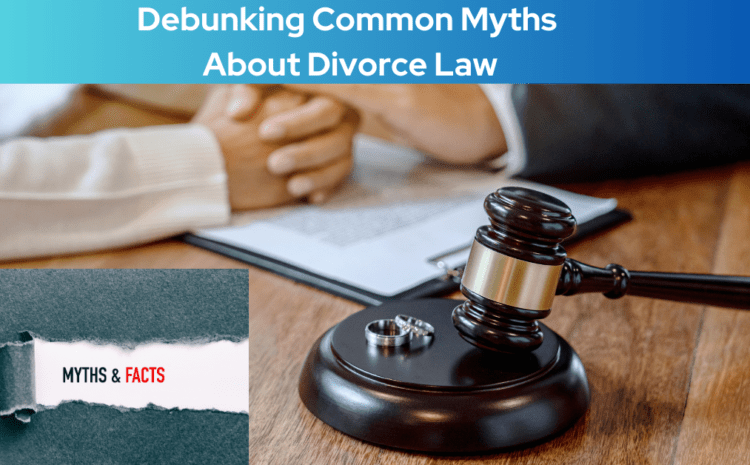
Divorce is a sensitive issue and common opinions or rumors about Divorce laws could have a potential negative impact. This could lead to inaction, and wrong actions based on these presumed myths.
As rightly said by Joseph Cambell, “Myths are public dreams, and dreams are private myths”
At Divorcebylaw we battle these myths that are deeply engrained in the Indian psyche related to divorce. We aspire to make people more aware and make informed decisions based on legal facts which unfortunately give a false impression about divorce and its related laws.
Get a renewed perspective on divorce laws through this blog that demystifies the 7 common myths about divorce laws.
Myth No 1: Present Indian laws give a 50 % share to the wife in the case of Divorce
Truth: No, there is no direct law that states that there has to be a division of 50% of the property. The wife does have the right to have shelter, maintenance, and any finances she receives from her parents during marriage. Even the arrangement of shelter stands true only if she does not have her own house or she is financially unable to maintain her living. This is subject to conditions stated by law.
However, under Section 125 of Criminal Procedure Code, 1973 , u/s 20 (1) (d) of the Protection of Women from Domestic Violence Act, 2005, u/s 24 & 25 of Hindu Marriage Act, 1955, u/s 37 of Special Marriage Act, 1954, u/s 3 & 4 of Muslim Women (Protection of Rights on Divorce) Act, 1986, u/s 36 & 37 of Divorce Act, 1869 a wife can apply for alimony/ maintenance in a court of law. In such cases, if evidential proof shows the need, the husband will be liable to pay her alimony such sum, as the court may order, till her lifetime.
Myth No 2: Divorce proceedings are lengthy and expensive
Truth: No two cases are similar and the length and expenses depend on the complexities involved and the type of divorce filed. Mutual divorce with the consent of both involved is faster as there is no conflict between the couple. Contested divorces consist of conflicts regarding what accusations are charged, alimony, child custody, financial settlements, etc, and hence need more time and expenses to fight the case.
Myth No 3: Mothers always get custody of the child
This is a generalization. Indian law is unbiased and stands for the “right of the child”. Safeguarding the mental, physical, and emotional needs of the child is prime and all decisions are taken accordingly. If the court finds the father more responsible and capable of taking care of the child the custody of the child goes to the father. An important point to remember is that the child’s interest and inclination is also a factor taken into consideration.
Myth 4: The wife cannot reside in the shared house with her Spouse when she files for divorce
Truth: The Protection of Women from Domestic Violence Act, 2005 gives the right to residence to the wife. The wife has the right to reside in the matrimonial home till the divorce is finalized, irrespective of ownership.
Myth 5: Separation between a husband and wife for more than 7 years equivalent to legal divorce
Truth: The number of years of separation doesn’t have any role to play in the legal realm, subject to certain rare cases. A legal decree of divorce from a competent court for dissolution of marriage is essential to consider two people divorced.
However, under different laws that we consider for marriage and divorce in cases where one of the spouses is presumed to be dead, goes away, gets lost, unheard of or is not found or there are no records about whereabouts for 7 years or more, the petitioner can seek divorce considering this as a ground for divorce.
Myth 6: Your spouse must agree to the divorce to get legally divorced
Truth: You have the right to file for divorce and you will be granted a divorce at the end of the proceeding if there is solid evidence that proves that the marriage involves adultery, domestic abuse, or other valid reasons. In other cases, the onus of proving why the need for divorce stands invalid has to be proved by the other spouse.
The situation however remains complex and, it is highly recommended to consult a competent divorce lawyer to ensure a quicker divorce.
Myth 7: Only wife can claim Maintenace in divorce cases
Truth: In divorce casesboth spouses are eligible to receive maintenance from the other spouse, depending on the facts and information that substantiate the need for the same. In today’s world where both spouses work for a living, the Supreme Court necessitates that an affidavit of assets and liabilities of both should be submitted, helping the court to come to a concrete conclusion on who needs maintenance.
Divorce was considered a taboo and hence resulted in these myths that emanate from hush-hush conversations regarding the same. Today both men and women can make informed decisions if they have the legal knowledge and the support of a competent legal professional who can handle divorce cases with expertise and experience.
It’s time to stop making presumptions and wake up to the world of making informed, well-thought decisions based on facts and truths. To quote John Locke, “The end of law is not to abolish or restrain, but to preserve and enlarge freedom.” This is exactly what we have tried to do by debunking these 7 myths about Indian divorce laws.

Advocate Kiran S R – A highly skilled, passionate, dedicated advocate, with vast wealth of knowledge, professionalism, ethical approach and expert skills. One of the sharpest legal mindset brings the best principles of legal practice to the forefront. A qualified Engineer turned Advocate. His passion, dedication and vision to help and assist his clients achieve the best results is his driving force.

